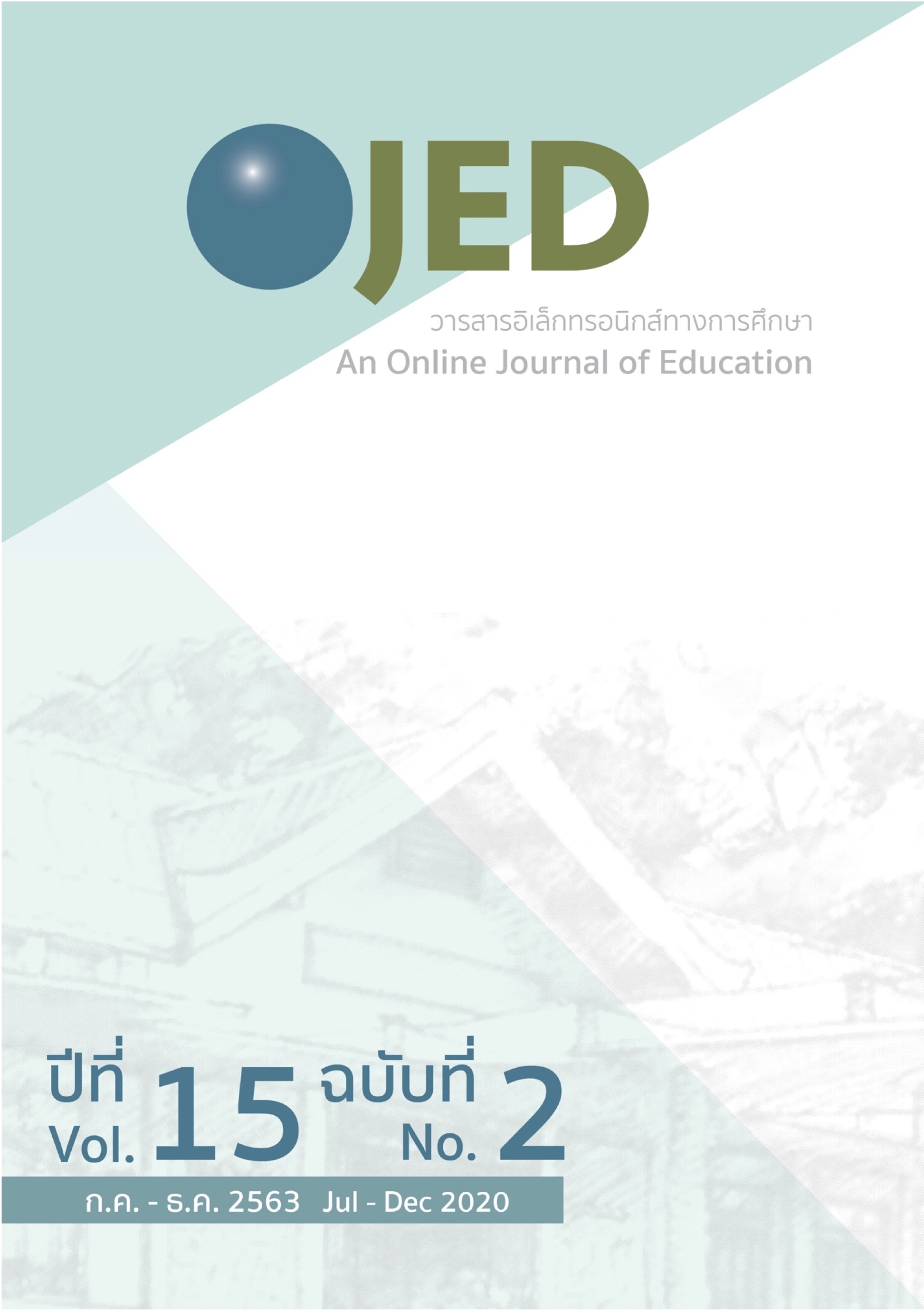Effects of Organizing Mathematics Learning Activities Using Inquiry-Based Learning on Mathematical Knowledge and Critical Thinking of Ninth Grade Students
DOI:
https://doi.org/10.14456/ojed.2020.28Keywords:
mathematical knowledge, critical thinking, inquiry-based learningAbstract
This research utilized a one-group pretest-posttest design. The purposes of this research were:
1) to compare mathematical knowledge of ninth grade students learning by organizing mathematics learning activities using inquiry-based learning, with 60 percentage of criteria, and 2) to compare critical thinking of ninth grade students before and after mathematics learning activities using inquiry-based learning. The samples were 50 ninth-grade students of a school under Bangkok Secondary Educational Service Area Office 1. Research tools consisted of the mathematical knowledge test and the critical thinking tests. Data were analyzed by using arithmetic mean, percentage of arithmetic mean, standard deviation, and t-test. The results of the research revealed that 1) the mathematical knowledge of ninth grade students after learning by organizing mathematics learning activities using inquiry-based learning was lower than 60 percentage of criteria, and 2) the critical thinking of students after learning was higher than that of students before learning, at a .05 level of significance.
References
กมลทิพย์ ต่อติด. (2544). ผลของการฝึกกระบวนการสืบสอบที่มีต่อความสามารถในการคิดเชิงเหตุผลและความสามารถในการคิดแก้ปัญหาของนักเรียนชั้นประถมศึกษาปีที่ 6 [วิทยานิพนธ์ปริญญามหาบัณฑิต ไม่ได้ตีพิมพ์]. จุฬาลงกรณ์มหาวิทยาลัย.
ดิษพล เนตรนิมิต. (2558). ผลการใช้รูปแบบการจัดกิจกรรมการเรียนรู้แบบสืบเสาะหาความรู้ 5 ขั้นตอน (5Es) ร่วมกับการใช้คำถามระดับสูงที่มีผลต่อความสามารถในการให้เหตุผลและมโนทัศน์ทางคณิตศาสตร์ เรื่องฟังก์ชัน ของนักเรียนชั้นมัธยมศึกษาปีที่ 4 [วิทยานิพนธ์ปริญญามหาบัณฑิต ไม่ได้ตีพิมพ์]. มหาวิทยาลัยบูรพา.
ณัฐิกานต์ รักนาค. (2552). การพัฒนารูปแบบการเรียนการสอนตามแนวคิดการถ่ายโยงการเรียนรู้ เพื่อส่งเสริมทักษะและกระบวนการทางคณิตศาสตร์ด้านการแก้ปัญหา การให้เหตุผล และการเชื่อมโยง ของนักเรียนมัธยมศึกษาปีที่ 1 [วิทยานพินธ์ปริญญาดุษฎีบัณฑิต ไม่ได้ตีพิมพ์]. จุฬาลงกรณ์มหาวิทยาลัย.
ณิชาพร เจริญวานิชกูร. (2560). ผลการจัดกิจกรรมการเรียนรู้คณิตศาสตร์ที่เน้นแบบอย่างและกลวิธีตามแนวคิดของเมย์เนสและจูเลียน-ชูลต์ซที่มีต่อความรู้ทางคณิตศาสตร์และความสามารถในการแก้ปัญหาทางคณิตศาสตร์ของนักเรียนมัธยมศึกษาปีที่ 5 [วิทยานพินธ์ปริญญามหาบัณฑิต ไม่ได้ตีพิมพ์]. จุฬาลงกรณ์มหาวิทยาลัย.
นาตยา ปิลันธนานนท์. (2542). การเรียนรู้ความคิดรวบยอด. https://kukr.lib.ku.ac.th/db/BKN/search_detail/dowload_digital_file/192936/26748
พรรณนภา เพิ่มพูล. (2549). ผลของการเรียนการสอนด้วยกลวิธีการอ่านแบบร่วมมือที่มีต่อความสามารถในการอ่านภาษาไทยเพื่อความเข้าใจของนักเรียนชั้นมัธยมศึกษาตอนต้น [วิทยานพินธ์ปริญญามหาบัณฑิต ไม่ได้ตีพิมพ์]. จุฬาลงกรณ์มหาวิทยาลัย.
สถาบันทดสอบทางการศึกษา. (2561). สรุปผลการทดสอบทางการศึกษาระดับชาติขั้นพื้นฐาน (O-NET) ชั้นมัธยมศึกษาปีที่ 3 ปีการศึกษา 2561. http://www.newonetresult.niets.or.th/AnnouncementWeb/PDF/SummaryONETM3_2561.pdf
สถาบันส่งเสริมการสอนวิทยาศาสตร์และเทคโนโลยี. (2562). การแถลงข่าวผลการประเมิน PISA 2018. https://drive.google.com/file/d/18DKqGcId1dN6IWF07TXG8YZsQOg-NlWZ/view
เสาวรัตน์ รวมแก้ว. (2552). ผลของการจัดกิจกรรมการเรียนรู้คณิตศาสตร์ โดยใช้การสืบสอบแบบแนะแนวทาง ที่มีต่อมโนทัศน์และความสามารถในการให้เหตุผลทางคณิตศาสตร์ของนักเรียนมัธยมศึกษาปีที่ 2 [วิทยานิพนธ์ปริญญามหาบัณฑิต]. Chulalongkorn University Intellectual Repository (CUIR). http://cuir.car.chula.ac.th/handle/123456789/59079
อัมพร ม้าคนอง. (2554). ทักษะกระบวนการทางคณิตศาสตร์: การพัฒนาเพื่อการพัฒนาการ. ศูนย์ตาราและเอกสารวิชาการ คณะครุศาสตร์ จุฬาลงกรณ์มหาวิทยาลัย.
Ausubel, D. P., Novak, J. D., & Hanesian, H. (1968). Educational psychology: A cognitive view. Holt, Rinehart and Winston
Ennis, R. H. (1985). A logical basis for measuring critical thinking skills. Educational leadership, 43(2), 44-48.
National Council of Teachers of Mathematics. (1989). Curriculum and Evaluation Standard for Schools Mathematics. Reston: Virginia.
Pedaste, M., Mäeots, M., Siiman, L. A., De Jong, T., Van Riesen, S. A. N., Kamp, E. T., Manoli, C. C., Zacharia, Z. C., & Tsourlidaki, E. (2015). Phase of inquiry-based learning: Definitions and the inquiry cycle. Educational Research Review, 14, 47-61. https://doi.org/10.1016/j.edurev.2015.02.003
Sumarna, N., Sanusi, W., & Herman, T. (2017). The Increase of Critical Thinking Skills through Mathematical Investigation Approach. Journal of Physics: Conference Series, 812. https://doi.org/10.1088/1742-6596/812/1/012067
Downloads
Published
How to Cite
Issue
Section
License
Copyright (c) 2020 An Online Journal of Education

This work is licensed under a Creative Commons Attribution-NonCommercial-NoDerivatives 4.0 International License.




